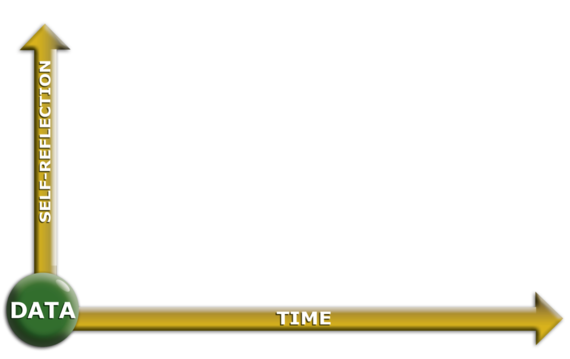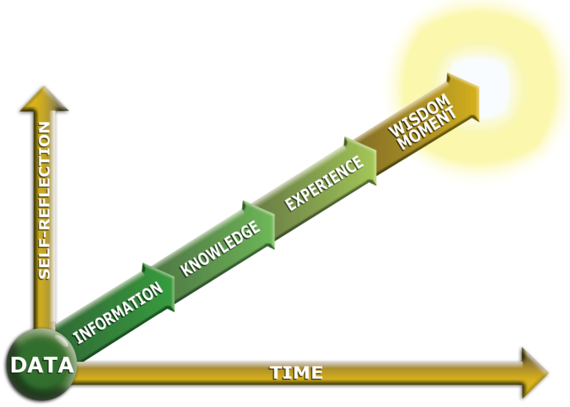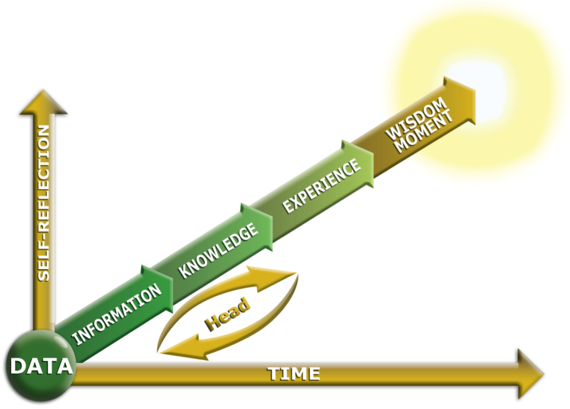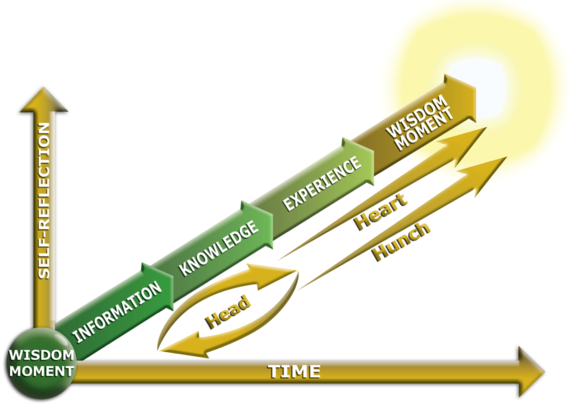Co-authored by Gregory Stebbins
Dr. Stebbins has over three decades of experience coaching emerging and senior executives in the development of wise social intelligence skills, which is an integration of an individual’s head (intellect), heart (courage) and hunch (intuition). The wisdom development process helps leaders examine their inner dynamics, which drive how they act in an organizational environment. Leadership effectiveness means being accountable which requires awareness of and taking ownership of moment-to-moment beliefs, fears, hopes, desires, defenses and impulses.
Leaders then integrate their knowledge and experience and transform it into social intelligence that can be applied to guide an organization’s success. Team effectiveness with senior leaders requires a high level of collaborative dialogue to ensure that they are mutually accountable to the purpose and outcomes of the organization.
Dr. Stebbins is a colleague at Insight Institute and the co-designer of its flagship Letting Wisdom Lead program. Over the last 25 years he has created or co-created five companies. His senior business leadership experience is combined with his in-depth understanding of interpersonal dynamics. Dr. Stebbins is a member of the Consulting Psychologist division of the American Psychological Association.
His former clients include many Fortune 1000 and Mid Cap companies, including: Abbott Laboratories, Amgen, CBRE, Dole Food Company, Fluor Corporation, IBM, RCA, 3M, and Sodexho.
Dr. Stebbins has an MBA in Finance from the University of Southern California, Los Angeles and an Ed.D. from Pepperdine University’s school of education and psychology. He has lectured at University of Southern California, and the MBA program at University of California at Los Angeles. Greg has been listed in Marquis Who’s Who in the World for more than two decades. Greg has an active and ongoing meditation practice stretching over more than four decades.
Self-Compassion – The Doorway to Wise Leadership
In Western corporations, there is a deeply ingrained cultural belief that high-performance requires “suffering”. In other words, many people believe that distress, discomfort, and pressure ignites performance. This belief and associated behaviors are toxic in nature, ineffective, unsustainable and lead to burnout and career derailment (Gallup, 2013; Kilburg, 2000).
The primary focus of leaders in a VUCA (a.k.a. Volatile, Uncertain, Complex, and Ambiguious) environment is to deliver results as the only valid measurement of success. Given the preponderance of command and control leadership style in the business environment, executives have few resources to manage the heavy self-criticism that occurs when falling short of the desired performance. When making mistakes, many executives seem unable to compassionately manage shame, blame, and self-criticism. Instead, executives display acute self-criticism, self-condemnation, and negative, harsh self-talk. People do this hoping that the self-inflicted punishment and “suffering” will prevent them from making the same mistake again in the future and gain the sympathy of those around them.
In the safety of coaching environments, many executives secretly admit being harsh on themselves, and/or on other people, just because they believe “being kind” will make them or others complacent and weak. We condition ourselves by what we tell ourselves. We can undermine or encourage ourselves and others. Moreover, we can continue to be blind to the fact that we are in charge of the internal and external environments we create.
The troubling question to ponder is: Has being cruel or harsh increased engagement, innovation, and empowerment in corporations? It seems not, according to Gallup’s(2013) staggering poll results which indicated only 13% of employees reported being engaged. In other words, 87% of talented people either are disengaged or actively disengaged. Is this the best we can do? How long will it take us to let go of habitual leadership strategies that only foster disengagement, disempowerment, and burnout? Is there a need to wise up?
Much of our professional life as academics, consultants, trainers, facilitators, and leadership coaches has afforded us the opportunity to study various approaches to leadership transformation. A great deal of the current syllabus continues to emphasize the use of the head/brain to analyze and solve complex problems to understand what works and why. However, logic alone seems insufficient to find the wisest solutions to the pressing problems.
The Wisdom Economy and Compassionate Capitalism
Information has become a commodity. Transformation has become a necessity. We can access more information than we can currently digest. Still, most of this does not help begin to tap into what it means to be human. The emerging wisdom economy will be more focused on bringing forward the unique gifts of each person. Compassionate Capitalism is about sharing those talents for the highest good of the community. Like the healthy cells in a body that work in harmony with other cells in the body, individuals are called forward to share the best of themselves to shift and uplift the community. No cell in the body accumulates 99% of the nutrients, leaving the rest of the cells starving to death. Shockingly 1% of the population today accumulates 99% of the global wealth. If a body cannot function properly with only 1% of its cells healthy; can a society work correctly when 1% of its population enjoys unparalleled wealth while the other 99% are trying to survive? Can we develop High-Quality Connections without Empathy and Compassion? We claim that cruelty generates more cruelty, whereas Compassion stops the cycle of self-destruction that cruelty begets.
The world is in rapid transition. Moreover, so is the way we understand doing business. Over the years, many approaches to leadership have emerged. For instance, purpose was articulated by Victor Frankl, and the theory of servant leadership by Greenleaf. Furthermore, Fairholm introduced spiritual leadership, Covey the principle-centered leadership, Senge the learning organization, and Barrett the importance of value-based transformational leadership. Today the world needs 21st century leaders who develop cultures that embrace a higher consciousness.
If a healthy body is the result of cells interacting with other cells through loving, humans might have to learn how to interact lovingly. Moreover, its starts with just one. Look what happens in a body when just one single cell decides to kill other healthy cells. We call this dis-ease Cancer. This same process operates in society and in organizations; they become destructive.
Professor Dutton and her team of researchers at the University of Michigan emphasized the importance of developing High Quality Connections as a stepping stone in creating a healthy organization in which people can flourish. When the cells of our body communicate with one another in harmony, the cells are at ease with each other and health results. The body is nothing less than a very efficient society of billions of cells aligned in harmony to keep the body healthy. It is when one cell goes out of balance that the relationship goes out of balance and negative emotions emerge leading to dis-ease and ultimately death. Similarly, organizations suffer today from silo thinking, misalignment between departments, team distrust, and individual conflicting priorities. Organization is indeed suffering and contracting and can eventually disappear.
Wisdom Development Process
The process for developing leadership wisdom requires us to integrate our heart into our experience. If we only use our mind, we can only go so far.
Self-reflection over time is a critical tool for developing wisdom. Our starting point often revolves around data. Some of this data is perceived to be external to us and some internal to us (unless we are living in a state of denial and then all data is perceived to be external to us).
In our quest for wisdom we evolve through several stages. When we take the data we have and start to sort it, we begin to see the various relationships between the individual pieces. Sorted data begins to resemble what we call information. Today, large companies are using their massive computer power to sort accumulated consumer data to recognize relationships. In a case of unintended consequences, Target noticed that when a woman was pregnant she would buy certain products together. Hoping to leverage this newfound information, direct marketing was sent to women who had purchased these items along with advertisements for other baby related products. One irate parent demanded to know why his 16-year old daughter was receiving such a mailing, not knowing that she was indeed pregnant. The information was available but the wisdom to compassionately act on that information was missing.
When multiple patterns start to appear we would suggest that knowledge is also appearing. This doesn’t mean that understanding or insight has begun to appear. For that to happen it takes experience, more specifically experience that has been reflected on. The deeper the reflection, the greater insight into the experience. With enough time spent on self-reflection – regardless of the data, information and knowledge – it’s possible to have a wisdom moment. Does this wisdom moment make us a wise leader? Probably not. To become a wise leader requires multiple wisdom moments that become the new data. This is a process that folds back on itself and takes time for self-reflection.
Many leaders get stuck in a mental loop around data, information and knowledge. When they reach the limits of what they know, they often decide that they need more data or perhaps better data. They then go through the process distilling the new data into information and knowledge. Most of this effort takes place in their head and has relatively little experience added to the equation.
To break through the mental do-loop requires getting out of our head and putting our heart into it.
Heart isn’t often found in today’s leadership education, which mostly focuses on the mind. This can be challenging, as incorporating the heart into any leadership approach, requires courage. Leadership courage has been written about for eons. Both loving and courage have a similar root: heart. However, we contend that leadership wisdom requires integrating head (our mind), our heart (compassion) and our hunch (intuition). It takes courage to engage our heart and to confront fear (our own or others’), pain, danger, uncertainty or perhaps intimidation (another fear-based behavior). The heart knows when the mind doesn’t. Self-reflection requires listening to the heart long enough that the mind quiets.
Our experience is that opening the heart and actively using the wisdom of the heart in making important decisions opens a doorway into leadership wisdom. It has required that we use our heart more often and in everyday decisions. Actively listening to the guidance of the heart is regenerative and thus sustainable.
The doorway to opening the heart and allowing wise leadership to emerge is through self-compassion. So what is Compassion? Compassion is the courage to see the cause of suffering and the willingness to alleviate the suffering in oneself (Self-Compassion) or others (Compassion). Hence, Compassion is a very active, pragmatic, and courageous act, far from the cliché of a fluffy competency or attribute. Compassion is not for the faint of heart.
Self-Compassion Cultivation Process
Although becoming a compassionate leader might take practice, what matters is to initiate the journey of personal transformation. Start now. It is never too late to start transforming. Here are some tips to initiate the journey.
Manage the self-criticizer: Develop instead a courageous, compassionate observer. Watch the way you speak to yourself when things do not go the way you had anticipated. Refuse to self-attack and instead wholeheartedly accept that you are doing the best you can with what you know. Had you known better you would have done better. Encourage yourself to do better next time instead of justifying why not to do better next time. Beating yourself up will not give you the necessary energy to do the best you can the next time. Learn to encourage yourself to do better the next time, and the next time. Please note that we are not saying procrastinate. On the contrary, compassion requires action. Take action now to compassionately self-correct instead of fiercely self-judging.
Resolve to put an end to any feeling of isolation: Develop high-quality connections instead. Change the way you relate. The easiest way to shift the quality of relations is with small acts of kindness. Be kind to yourself first and then be kind with others. Moreover, if this does not work, do kind acts with others until eventually you are kind to yourself. Kindness will purge out any negativity built within, and will elevate energy; it will shift the attitude. It is a fact that emotions are contagious. Let a positive focus elevate others. By elevating energy, you will stop the negative spiral that self-judging generates. The acts of kindness will help shift any negative emotion. Also, being kind does not mean you appear weak or soft. In fact, being kind can require great strength and is a demonstration of self-confidence.
Focus on the doing: Avoid fantasizing about the should or should have that pave the way to negativity. Being mindful does not mean avoiding experiencing the pain present. It means stop ignoring the pain. Stop exaggerating the pain. Pain is part of the growing process whereas suffering is a personal choice. Every one of us on the planet experiences some degree of pain. There are no exceptions.
The Benefit is the Bottom Line
Moving an organizational culture from one that is heavy on criticizim of self and others into one of self-compassion and wisdom is not likely to be easy. However, in a transforming world with evolving economic realities, change is inevitable. You can be at the effect of the change or you can take heart and be among those creating the new reality of wisdom leadership based on compassion and, most importantly, self-compassion. The enhancement in performance and greater engagement will become obvious—to you, your colleagues, and your organization.
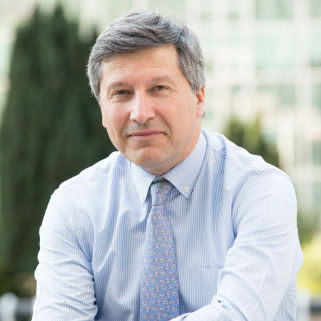
Marcos Cajina
President
Marcos has a compelling blend of intelligence, insight, humor, and experience that supports clients bridge the difference between understanding and doing.
He brings conceptual rigour and efficient support to the learning engagement. The focus of his work is to help leaders improve performance and well-being.
A provocateur and a challenger, clients, have multiplied their effectiveness in many different ways.

